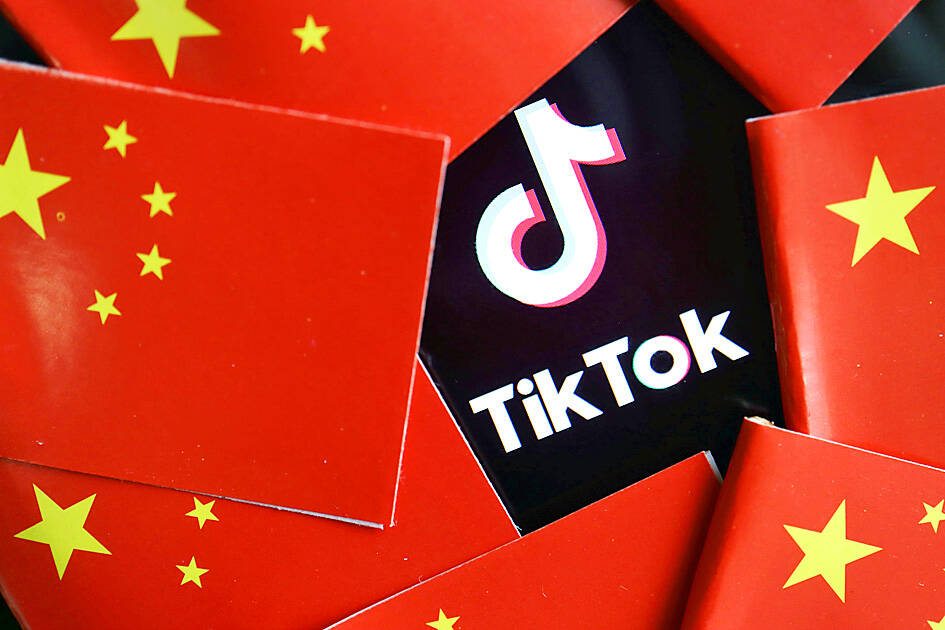Young Taiwanese are increasingly consuming Chinese content on TikTok, which is changing their views on identity and making them less resistant toward China, researchers and politicians were cited as saying by foreign media.
Asked to suggest the best survival strategy for a small country facing a powerful neighbor, students at National Chia-Yi Girls’ Senior High School said “Taiwan must do everything to avoid provoking China into attacking it,” the Financial Times wrote on Friday.
Young Taiwanese between the ages of 20 and 24 in the past were the group who most strongly espoused a Taiwanese identity, but that is no longer the case, it wrote, adding that this age group had also begun using colloquial terms previously only used in China.

Photo: REUTERS
Citing last year’s “Taiwan Internet Report,” an annual independent survey, the newspaper wrote that while only about 22 percent of Taiwanese are TikTok users, as many as 44 percent of elementary-school students and 60 percent of junior-high school students use the app. The majority of those young users are girls, it added.
Also, while the number of users in Taiwan remains lower than in the US or some European countries, concerns about the app’s influence on young people are especially pronounced in Taiwan, given the country’s relationship with China.
While most of the users are interested in dance or entertainment-related content, TikTok’s algorithm pushes “soft” political content to all users, it said, adding that researchers who created an account masquerading as a young female user were shown propaganda portraying Chinese “democracy” favorably in comparison to Taiwan’s political system.
The Financial Times wrote that studies last year by Rutgers University researcher Lee Jussim found that TikTok’s algorithm suggested a “disproportionately high ratio” of content favorable to the Chinese Communist Party compared with other apps such as Instagram or YouYube, and that users of the platform tended to hold a significantly more favorable view of China’s human rights record. Users of the platform “increasingly inhabit echo chambers,” it said.
Taiwanese think tank Doublethink Lab researcher Eric Hsu said that even if TikTok does not change attitudes toward China among young Taiwanese, it would weaken their vigilance and willingness to resist.
He believes that this subtle influence is more worrying because it might unconsciously change the values and political attitudes of Taiwanese in general.
Taiwanese young people are frustrated with local economic and social issues, such as stagnant wages and high housing prices, and TikTok would play to these sentiments, further exacerbating the situation, he said.
The Financial Times cited Democratic Progressive Party (DPP) member Enoch Wu (吳怡農) as suggesting Taiwan follow the US’ lead in banning TikTok, while DPP Legislator Puma Shen (沈伯洋) said that doing so would be difficult.
If the ruling DPP tried to ban TikTok, it would be attacked for limiting free speech, Shen said.
“We need to find an effective way of communicating with our young people” to avoid shattering “their trust in our democracy,” Hsu said.
“Once our society is divided and our democratic system is no longer trusted, Taiwan will lose its ability to resist China,” he added.

TRAGEDY STRIKES TAIPEI: The suspect died after falling off a building after he threw smoke grenades into Taipei Main Station and went on a killing spree in Zhongshan A 27-year-old suspect allegedly threw smoke grenades in Taipei Main Station and then proceeded to Zhongshan MRT Station in a random killing spree that resulted in the death of the suspect and two other civilians, and seven injured, including one in critical condition, as of press time last night. The suspect, identified as a man surnamed Chang Wen (張文), allegedly began the attack at Taipei Main Station, the Taipei Fire Department said, adding that it received a report at 5:24pm that smoke grenades had been thrown in the station. One man in his 50s was rushed to hospital after a cardiac arrest

SAFETY FIRST: Double the number of police were deployed at the Taipei Marathon, while other cities released plans to bolster public event safety Authorities across Taiwan have stepped up security measures ahead of Christmas and New Year events, following a knife and smoke bomb attack in Taipei on Friday that left four people dead and 11 injured. In a bid to prevent potential copycat incidents, police deployments have been expanded for large gatherings, transport hubs, and other crowded public spaces, according to official statements from police and city authorities. Taipei Mayor Chiang Wan-an (蔣萬安) said the city has “comprehensively raised security readiness” in crowded areas, increased police deployments with armed officers, and intensified patrols during weekends and nighttime hours. For large-scale events, security checkpoints and explosives

A car bomb killed a senior Russian general in southern Moscow yesterday morning, the latest high-profile army figure to be blown up in a blast that came just hours after Russian and Ukrainian delegates held separate talks in Miami on a plan to end the war. Kyiv has not commented on the incident, but Russian investigators said they were probing whether the blast was “linked” to “Ukrainian special forces.” The attack was similar to other assassinations of generals and pro-war figures that have either been claimed, or are widely believed to have been orchestrated, by Ukraine. Russian Lieutenant General Fanil Sarvarov, 56, head

PUBLIC SAFETY: The premier said that security would be tightened in transport hubs, while President Lai commended the public for their bravery The government is to deploy more police, including rapid response units, in crowded public areas to ensure a swift response to any threats, President William Lai (賴清德) said yesterday after a knife attack killed three people and injured 11 in Taipei the previous day. Lai made the remarks following a briefing by the National Police Agency on the progress of the investigation, saying that the attack underscored the importance of cooperation in public security between the central and local governments. The attack unfolded in the early evening on Friday around Taipei Main Station’s M7 exit and later near the Taipei MRT’s Zhongshan